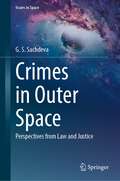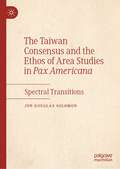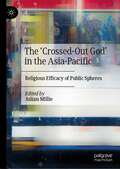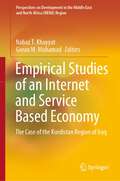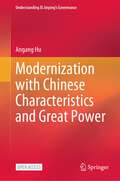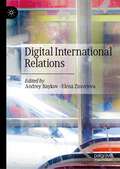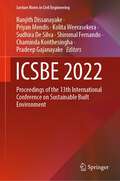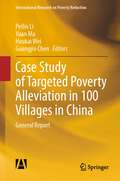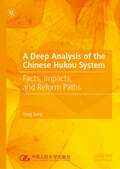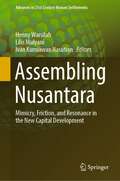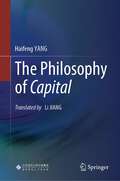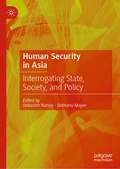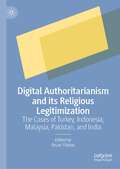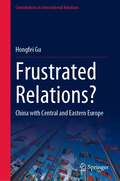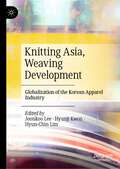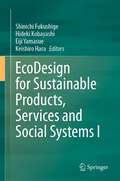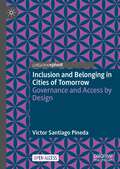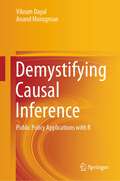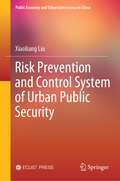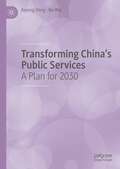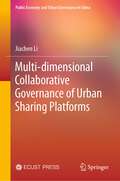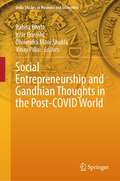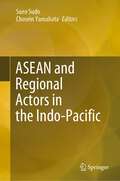- Table View
- List View
Crimes in Outer Space: Perspectives from Law and Justice (Issues in Space)
by G. S. SachdevaThis book flags and contemplates the lurking problem of space crimes that may escalate and expand with diversification of space activities, greater footfall on the celestial bodies and passage of time, for the lack of appropriate solutions. It appraises the incumbent problems to evolve solutions and make recommendations regarding space crime situations. Recognizing current situation where commercial space travel has commenced, and space tourism is not far behind, the book takes a pole position on discussing the topic with its endemic challenges. Space transportation is expected to lead to commercial mining of celestial mineral resources from the Moon and asteroids, as has been found technically feasible and commercially viable. Space-specific products have been identified for industrial mining, processing, and manufacturing, for which manpower would be necessary, howsoever minimal, despite artificial intelligence devices. Blueprints for space habitations on the Moon and Mars are being prepared. In this scenario, where outer space and celestial bodies may soon be inhabited by multi-nationality, multi-ethnic and multi-cultural groupings of tourists, workers, and residents, given cramped and not so comfortable or private living spaces, attitudinal disparities and conflicting beliefs, differences, disputes, conflicts, and crimes are sure to raise their head. Economic activity and business culture may usher in crimes of competition and spying on intellectual property. Space crimes through technologies like cyber, lasers, etc., may also permeate the space domain for ill-intentioned abuses. The criminals may be individuals or collective groups or incognito terrorists. The book also discusses crimes and near-crimes that have already occurred in space but have been ignored or condoned. Absence of sovereignty on celestial bodies coupled with crimes in space or on celestial bodies, presents problems of jurisdiction, extradition, and other legal procedures. The dilemma of multi-national judicial systems, legal codes and norms of social justice need to be resolved by a specialized treaty reconciling major bends in the existing system vis-à-vis the nature of space crimes. Limitations in handling such crimes by the existing judicial system under established doctrines of international law by International Court of Justice or International Criminal Court, is highlighted in the book. It has strong take-aways for research scholars, law fraternity, diplomatic corps, judicial administration, policy-makers and the political class, enabling them to pro-actively initiate action for suitable answers.
The Taiwan Consensus and the Ethos of Area Studies in Pax Americana: Spectral Transitions
by Jon Douglas SolomonThis book constitutes a timely intervention into debates over the status of Taiwan, at a moment when discussions of democracy and autocracy, imperialism and agency, unipolarity and multipolarity, dominate the intellectual agenda of the day. Pursuing a parallel trajectory that is both epistemic and historical, that is traced out in relation both to Taiwan’s recent history and to the disparate forms of knowledge production about that history, this work engages in scholarly debate about some of the burning issues of our time, including transitional justice, hegemony and conspiracy in the digital age, debt regimes, cultural difference, national language, and the traumatic legacies of war, colonialism, anticommunism, antiblackness, and neoliberalism. Providing trenchant analyses of the fundamental bipolarity that persists amidst both unipolar and multipolar conceptions of the world schema inherited from the colonial-imperial modernity, this book will be of interest to scholars in many fields, including translation studies, postcolonial studies, Marxism studies, trauma studies, media studies, poststructural theory, gender studies, cold war studies, area studies, American studies, black studies, and so forth.
The ‘Crossed-Out God’ in the Asia-Pacific: Religious Efficacy of Public Spheres
by Julian MillieThis book explores the evaluations made by religious groups and individuals about the potential of public spheres for religious practice, focussing upon public religion in societies of the Asia-Pacific. Across this region we observe a resurgence of religious traditions, increasing mediatisation of religion, and an inward turn toward conservative political programs. Against this background, relations between religion and public domains are critical influences upon civic inclusion and equal citizenship.In contrast to conventional approaches to religion and public life that focus upon the public potential of religion, chapter authors focus upon the religious potential of public domains, taking the perspectives of religious actors as their points of departure. The book’s chapters capture the dynamic nexus between religion and politics in Asia-Pacific public spheres: why would Indonesia’s minority Shiite movement strive to develop a public profile in a national environment where it attracts widespread disapproval? What constructions of religion and public space make Banaras so unconducive to female mobility? Why does the success of the social services wing of Australia’s Salvation Army create anxiety for its religious wing? What is at stake for followers of Australian Spiritualism when they attend spirit-medium sessions? How are popular Islamic preachers vulnerable to action from Indonesia’s civil society organisations? What do media representations of Hajj pilgrimage by Indonesia’s presidents have in common with middle-class representations of gender? Why did Indonesia’s traditionalist Muslim intellectuals draw heavily upon the ideas of Jürgen Habermas in their theorisations of state-society relations?An epilogue by the Indonesian neo-traditionalist intellectual Ahmad Baso, the most prominent theorist of state-religion relations in that country, overviews the issues against the background of that country’s religious and political histories.
Empirical Studies of an Internet and Service Based Economy: The Case of the Kurdistan Region of Iraq (Perspectives on Development in the Middle East and North Africa (MENA) Region)
by Nabaz T. Khayyat Goran M. MuhamadThis book is a collection of eight studies covering several areas pertinent to the current technological and banking services situation in the Kurdistan region of Iraq. The economy of the Kurdistan Region of Iraq (KRI) is mainly dependent on oil revenue. The oil export revenue constitutes more than 90% of the government’s fiscal revenue. In addition to that, the public sector plays an excessive role in the economy, with public spending to GDP being over 70% while revenue from taxation constitutes less than 30% of total revenue. As the economy is not diversified, there is a large gap between demand and supply of locally produced tradeable goods, leaving the KRI economy highly dependent on imports. Another structural challenge of the KRI economy is its dependence on cash and a weekly financial system. Although the region has witnessed extraordinary economic growth from 2008 to 2014, the growth rate decreased from 8 to 1 percent, trade and investment dropped to 5 percent, and the unemployment rate significantly increased to over 20% by the end of the year 2019. To maintain the progress of economic development, it is necessary to upgrade the country’s industrial structure in order to be able to generate more value-added products, which requires advancement in technological infrastructure to employ more sophisticated technologies. There is not much written about Kurdistan and its economy, and yet there is a comprehensive development plan and resources to be used for education, research, rehabilitation, development, and reconstruction. As such, this book would be of interest to researchers, decision-makers, governmental and non-governmental organizations, undergraduate and graduate students, and the general public with an interest in the Middle East and contemporary Kurdish issues. It is a good up-to-date handbook for policymakers and NGOs involved in the rehabilitation, reconstruction, and development of Iraq.
Modernization with Chinese Characteristics and Great Power (Understanding Xi Jinping’s Governance)
by Angang HuThis open access book expounds in detail on the profound meaning and main characteristics of modernization with Chinese characteristics. This was done utilizing tools of historical investigation and fact-based research on the modernization of New China. The author provides a far-reaching outlook of the strategic goals and future trends of modernization with Chinese characteristics. In this book, the author answers the questions: What is modernization with Chinese characteristics? How did this modernization develop, and what are its main features? In what direction will it develop in the future? Why did China propose to basically realize the goal of socialist modernization by 2035? How can China achieve this ambitious goal on schedule? What major impact will this modernization have on China and the world? This book adheres to the concept of "knowledge for the people, knowledge for the country, and knowledge for mankind." It actively explores and summarizes the laws of modernization with Chinese characteristics and fully elucidates its characteristics. This book not only provides decision-makers with a basis for understanding national conditions and their national policy research, but also serves as an important reference for party members, cadres, and readers to understand the path of modernization with Chinese characteristics.
Digital International Relations
by Andrey Baykov Elena ZinovievaThe book is the beginning of new interdisciplinary research series at the intersection of international relations, diplomacy, law, economics, and politics on the basis of global digital transformation. Digital international relations form a new mode of interaction between states and in terms of solving the most pressing problems of modernity. Law, economics, diplomacy and education are selected as key areas of human activity that can become the sphere of perspective research of digital international relations. This book will interest diplomats, scholars of international relations, and of international law.
ICSBE 2022: Proceedings of the 13th International Conference on Sustainable Built Environment (Lecture Notes in Civil Engineering #362)
by Ranjith Dissanayake Priyan Mendis Kolita Weerasekera Sudhira De Silva Shiromal Fernando Chaminda Konthesingha Pradeep GajanayakeThis book highlights the latest knowledge and innovations in the fields of civil engineering and construction industry striving for a sustainable built environment. It consists of high quality and innovative research findings selected from the proceedings of the 13th ICSBE 2022 under the themes of sustainable construction, urban green infrastructure and planning, rainwater harvesting and water conservation, high-performance concrete, indoor environmental quality and indoor plants, wind and hydro-power energy, waste and wastewater management for enhanced sustainability, impacts of climate change, carbon footprint, global climate model and landscaping, material flows and industrial ecology, sustainable materials, etc.
Case Study of Targeted Poverty Alleviation in 100 Villages in China: General Report (International Research on Poverty Reduction)
by Peilin Li Yuan Ma Houkai Wei Guangjin ChenThis book is the general report of the targeted poverty alleviation and elimination project of 100 villages, presenting the overall progress of poverty alleviation and development of all sample villages in the tide of poverty alleviation. From 2016 to 2018, the project selected 104 poor villages (including those out of poverty) across the country to carry out national research and recorded the great changes in more than 100 poor villages in recent years with steps, nib and lens. Based on questionnaire survey data and data from village research reports, the book describes the basic village situation, poverty situation, village-level poverty management and assistance measures, causes of poverty and assistance measures, progress and results of targeted poverty alleviation in 100 poor villages across China since 2016.
A Deep Analysis of the Chinese Hukou System: Facts, Impacts, and Reform Paths
by Yang SongThis book explores China's hukou system, by which individuals are registered in a specific geographic region, and the prospects for reform. The history of the hukou system and its instrumental role in Chinese urbanization and labor markets is explained, and readers get a sense of what issues are prioritized by Chinese policymakers as they contemplate reform or change to this system, from hukou-based labor market discrimination, inequality of opportunity, multi-dimensional poverty of rural migrants, the public health consequences of non-hukou migration, and old age insurance for migrants without hukous. The author concludes with a stirring and practical call for hukou reform, articulating a cost-benefit model and providing an array of policy suggestions. This book will interest scholars of Chinese society, demographics and future urbanization.
Assembling Nusantara: Mimicry, Friction, and Resonance in the New Capital Development (Advances in 21st Century Human Settlements)
by Lilis Mulyani Henny Warsilah Ivan Kurniawan NasutionToday, the new Indonesian capital city, Nusantara, planning is being anticipated as “representing national identity,” “a model city,” or “a gift to the world,” and many other extraordinary labels. This book examines the reality of an ongoing developmental transformation of the Nusantara beyond those labels. It approaches its assemblage of humans, their works (plans, documents, policies, and others), non-human objects (biodiversity, landscape, geography, physical infrastructure, buildings, and public spaces), processes, social relationships, social infrastructures, and others. It is organized into three themes—mimicry, friction, and resonance. The mimicry illustrates the similarities (and differences) between Nusantara and other capital cities in urban narratives, imageries, and forms. The friction studies how Nusantara moves actors who do not always agree, processes that do not always align or collaboration between diverse contradicting groups that intersect. The resonance observes how Nusantara resonates with, yet communicates its voice toward, the world. The three concepts (originated from geography, anthropology, and sociology) frame the analytics of the various contributions of local and foreign scientists from multiple disciplines. Overall, the book recommends “Otorita Ibu Kota Nusantara” (Nusantara capital city authority) on the current experimentation and implementation of the urban vision and provides a reference for social scientists to study Nusantara. And more broadly, the book offers the current socio-spatial practices of capital city-making in Asia that are valuable for the region.
The Philosophy of Capital
by Haifeng YANGThis book attempts to reveal Karl Marx’s philosophical critique of the social being in capitalist societies from the text of Capital. Marxists’ different understandings of Capital in different historical periods reveal the rich meaning of Capital, which plays an important role in promoting Marxian philosophy. These different modes of interpretation also mean that the understanding of Capital is endless, because re-reading of Capital will always open up a new realm for the interpretation of Marxian philosophy. Since the financial crisis in 2008, Capital has once again become a hot topic in academic fields. However, in these new interpretations, there is no fundamental breakthrough in the illustration of Marx’s thought, because some either stick to the discussions in pure economic fields, some the revision of Marx’s manuscripts from the perspective of literature compilation, others the role of Engels’ edition. The popularity of Capital mainly stays in a certain emotion and in the internal requirements of critical reflection on capitalist society.
China’s Approach to Energy Security: An International Comparative Perspective
by Shaofeng ChenThis book aims to analyze how and why China takes a state-managed marketization approach (SMMA) to energy security against the backdrop of global efforts of decarbonization and intensified strategic competition between China and the United States. How, and why, does China's SMMA work? Taking an evolving, historical perspective, this book explores China’s perception of energy security, the policy process, institutional restructuring in China's petroleum industry, China's foreign energy quest, and the ramifications of the Chinese approach on the international energy market and on world decarbonization. To demonstrate to what extent China’s SMMA differs from other countries, it also makes a comparative analyses of the approaches by China, the US and India. This book will keenly interest scholars of the Chinese political economy, climate change, and geopolitics.
Human Security in Asia: Interrogating State, Society, and Policy
by Debasish Nandy Debtanu MajeeThis book discusses Human Security from a theoretical perspective. It builds theories in order to understand a phenomenon in a structured and well-ordered way. It sheds light on the conditions of the economy, food, health, community, environmental and political security in Asian states. It explores the idea of human security to understand the issues jeopardizing an individual’s security in the Asian continent and suggests policies to overcome these problems. This book argues that the nature of the government and the constitution are equally essential in ensuring the human security of a country. Some countries in Asia are not only economically vulnerable but also politically disrupted. The issues of hunger, poverty, illiteracy, militancy, terrorism, and ethnoreligious conflicts have posed threats to human security. The pandemic COVID-19 has brought a great humanitarian crisis. The role of the Asian states in combatting COVID-19 and protecting public health is highlighted in this book. With a multidimensional outlook this edited volume attempts to delineate an interdisciplinary discourse of human security in an Asian context.
Digital Authoritarianism and its Religious Legitimization: The Cases of Turkey, Indonesia, Malaysia, Pakistan, and India
by Ihsan YilmazThis book explores how digital authoritarianism operates in India, Pakistan, Turkey, Indonesia, and Malaysia, and how religion can be used to legitimize digital authoritarianism within democracies. In doing so, it explains how digital authoritarianism operates at various technological levels including sub-network level, proxy level, and user level, and elaborates on how governments seek to control cyberspace and social media. In each of these states, governments, in an effort to prolong – or even make permanent – their rule, seek to eliminate freedom of expression on the internet, punish dissidents, and spread pro-state propaganda. At the same time, they instrumentalize religion to justify and legitimize digital authoritarianism. Governments in these five countries, to varying degrees and at times using different methods, censor the internet, but also use digital technology to generate public support for their policies, key political figures, and at times their worldview or ideology. They also, and again to varying degrees, use digital technology to demonize religious and ethnic minorities, opposition parties, and political dissidents. An understanding of these aspects would help scholars and the public understand both the technical and social aspects of digital authoritarianism in these five countries.
Frustrated Relations?: China with Central and Eastern Europe (Contributions to International Relations)
by Hongfei GuThis book focuses on China’s foreign strategy and policy toward Central and Eastern Europe via the “China-CEEC” Cooperation Mechanism. It discusses the formation and evolution of the mechanism, concentrating on China’s leading role in this process, and covering a range of issues related to the mechanism’s organizational development. This discussion includes the broad context of China’s foreign policy, a coherent framework analysis of institution and cooperation issues, the internal aspects of the heterogeneity, external aspects of its asymmetry interactions, and finally, its emphases on cooperation in the two primary dimensions of great powers engagement and localization.After the end of the Cold War and the sudden and shocking collapse of the Soviet Union, the geopolitics of Central and Eastern Europe begins to undergo dramatic changes. Since then, an increase in public discussion in China about the transformation from the planned economy to market economy became very visible. Moreover, this part of the world perceives as the gate to Europe through almost forget Silk Road. Both factors have played a crucial role in shaping China’s interest in the region of Central and Eastern Europe. Following the points mentioned above, China’s interests in Central and Eastern Europe are due to several factors, including its frontier stability, national security, economic expansion, and search for new sources of energy and new markets for made in China products. Recognition of the importance of the region culminates in the recent Chinese grand strategy of “Belt and Road,” which highlights Central and Eastern Europe as the essential link in China’s plan New Silk Road strategy. In this regard, the “China-CEEC” Cooperation Mechanism has a crucial role in China’s “Go West” strategy.
Knitting Asia, Weaving Development: Globalization of the Korean Apparel Industry
by Joonkoo Lee Hyunji Kwon Hyun-Chin LimThis book offers a fresh look at the global apparel industry, focusing on Korean multinational corporations (MNCs) and their growing role in building regional connections and shaping economic and social development in Asia. Focusing on the multinationalization of Korean apparel firms over the past decades and their upgrading to first-tier suppliers in apparel global value chains, this edited volume highlights a host of new challenges these emerging MNCs confront in the rapidly changing global apparel industry and provides an in-depth view of their expanding role and adaptive strategies in configuring regional connections in post-Pandemic Asia.
Islam in the Anglosphere: Perspectives of Young Muslims in Australia, the UK and the USA
by Ihsan YilmazUsing semi-structured interviews with 122 young Muslims in Australia, the United Kingdom (UK) and the United States of America (USA) from diverse ethnic backgrounds, this book investigates the lived reality of young Muslims from their own perspectives. It explores their ideas of key Islamic and secular issues, their struggles, world views, triumphs, how the stigmatized group negotiates their identity in these three English language speaking Western countries, 20 years after 9/11. The key aspect of this book is to transcend binaries and reductionisms by exploring what Muslims actually think and say rather than intellectual articulations on them. The book presents a very detailed account of these young Muslims in the Anglophone West on their political beliefs, their knowledge and understanding of sharia law, their interest and participation in local and transnational political activism, their positive and negative feelings about their own communities, and indeed how they define their community.
EcoDesign for Sustainable Products, Services and Social Systems I
by Shinichi Fukushige Hideki Kobayashi Eiji Yamasue Keishiro HaraThis 2-volume book highlights cutting-edge ecodesign research and covers broad areas ranging from individual product and service design to social system design. It includes business and policy design, circular production, life cycle design and management, digitalization for sustainable manufacturing, user behavior and health, ecodesign of social infrastructure, sustainability education, sustainability indicators, and energy system design. Featuring selected papers presented at EcoDesign 2021: 12th International Symposium on Environmentally Conscious Design and Inverse Manufacturing, it also includes diverse, interdisciplinary approaches to foster ecodesign research and activities. In the context of Sustainable Development Goals (SDGs), in particular SDG 12 (Responsible Consumption and Production), it addresses design innovations for sustainable value creation, considering technological developments, legislation, and consumer lifestyles. Further, the book discusses the concept of circular economy, which aims to develop circular business models for resource efficient society by taking advantage of digital technologies including artificial intelligence, internet of things, digital twin, data analysis and simulation. Written by experts from academia and industry, Volume 1 highlights sustainable design such as product and process design, collaborative design, sustainable innovation, digital technologies, design methodology for sustainability, and energy system design. The methods, tools, and practices described are useful for readers to facilitate value creation for sustainability.
Inclusion and Belonging in Cities of Tomorrow: Governance and Access by Design
by Victor Santiago PinedaThis open access book uncovers the historical context and entrenched beliefs that have perpetuated exclusionary urban landscapes and disadvantage for marginalized groups. It offers an in-depth exploration of the intricate interplay of geographical space, recognizing its pivotal role in shaping our cities and exacerbating spatial injustice. The construction industry, a vital agent in forging accessible environments, often falls short in accommodating persons with disabilities and older individuals. This important book underscores the urgent need for integrated approaches woven into the fabric of cities, companies, and the construction industry itself, to ensure universal accessibility. Drawing upon practical strategies and compelling case studies, the book presents actionable frameworks such as the DisCo Policy Framework and the Iceberg of Inequality Model, facilitating the assessment of progress towards achieving radical inclusion. Inviting readers to embark on a journey into the cities of tomorrow, where inclusion and belonging are the norm, it concludes with a simple idea: the future is accessible.
Demystifying Causal Inference: Public Policy Applications with R
by Vikram Dayal Anand MurugesanThis book provides an accessible introduction to causal inference and data analysis with R, specifically for a public policy audience. It aims to demystify these topics by presenting them through practical policy examples from a range of disciplines. It provides a hands-on approach to working with data in R using the popular tidyverse package. High quality R packages for specific causal inference techniques like ggdag, Matching, rdrobust, dosearch etc. are used in the book.The book is in two parts. The first part begins with a detailed narrative about John Snow’s heroic investigations into the cause of cholera. The chapters that follow cover basic elements of R, regression, and an introduction to causality using the potential outcomes framework and causal graphs. The second part covers specific causal inference methods, including experiments, matching, panel data, difference-in-differences, regression discontinuity design, instrumental variables and meta-analysis, with the help of empirical case studies of policy issues. The book adopts a layered approach that makes it accessible and intuitive, using helpful concepts, applications, simulation, and data graphs. Many public policy questions are inherently causal, such as the effect of a policy on a particular outcome. Hence, the book would not only be of interest to students in public policy and executive education, but also to anyone interested in analysing data for application to public policy.
Risk Prevention and Control System of Urban Public Security (Public Economy and Urban Governance in China)
by Xiaoliang LiuThis book, with a focus on the establishment of urban public security risk prevention and control system, carries out a comprehensive review and a comparative study of its development. It provides a systematical analysis to the inevitable security issues in the process of urban development and conducts an in-depth discussion on the background of times featuring heightened security risks as well as the main sources of current urban public security risks. In addition to analyzing the inner structure and development motivations, this book further summarizes the inner mechanism for the effective operation of urban risk prevention and control system and elaborates on the reasons why grassroots governance plays a vital role throughout the whole process. Moreover, this book sheds some light on the future development of urban security risk prevention and control system.Centering on the frontiers of urban public security risk prevention and control, this book probes into the important issues in establishing an effective urban public security risk prevention and control system by combining theory and practice. As a result, it is highly recommended for scholars, government officials, and practitioners in the field of emergency management.
Transforming China's Public Services: A Plan for 2030
by Keyong Dong Na WeiThis book explores the developmental direction of the modernization of China's basic public services in the context of national governance modernization. Describing the blueprint for the modernization of China's basic public services in 2030, including basic public education, basic medical and health services, basic old-age services, and basic public cultural services, this book reflects Chinese public management scholars' strategies for the modernization of China’s public services in the next 10 years and the path to get there. This book will interest scholars of Chinese governance, as well as readers who want to understand the current status, challenges and development strategies of China's public service and social policy fields.
Multi-dimensional Collaborative Governance of Urban Sharing Platforms (Public Economy and Urban Governance in China)
by Jiachen LiThis book gives a brief review of current development models and governance of urban sharing platforms, and looks into the economic efficiency of a novel market transaction model of sharing economy, which has been accelerated by high-density urban population and the Internet technology. With an aim to solve current problems featuring excessive competition, waste of resources, security risks, and unfair competition, this book delves into the two governance models in accommodation sharing platforms and bike and car sharing platforms and puts forward a multi-dimensional collaborative governance model that involves the participation of enterprises, the government, and the community. Under such a model, the platforms may utilize their own key technologies to implement supervision and solicit feedback; the government may resort to tax regulation and reallocating shared space to mitigate the negative externality effect and promote fair competition; and the community, as the basic unit of a city, may play its part through on-site participation and real-time feedback.
Social Entrepreneurship and Gandhian Thoughts in the Post-COVID World (India Studies in Business and Economics)
by Babita Bhatt Israr Qureshi Dhirendra Mani Shukla Vinay PillaiIn this edited book, we provide foundational tenets of Gandhian perspective, and present examples of social organizations that are aiming to insulate themselves by adopting community and village-centered approaches to restructuring socially-embedded economic activities that align with Gandhian principles. These cases highlight the relevance of Gandhi's thoughts in the field of social entrepreneurship. We examine key principles such as Sarvodaya (the welfare of all), Antodaya (the upliftment of the weakest), self-sufficiency, self-reliance, Nai Talim (holistic education), and Trusteeship. We explore how social organizations implement these principles to promote resilience and well-being at the community level. The COVID-19 pandemic revealed unsustainable practices in the world, including disrupted supply chains, contagious effects of integrated global economy that ignore the local self-reliance, and unsustainable internal displacement that make cities dependent on rural labor and rural population dependent on urban areas for jobs. These issues show that there are systemic problems with how our society and market are structured. The traditional way of development that focuses on profit maximization and unlimited wants has caused problems like inequality, resource depletion, and disproportionate wealth accumulation. Unlimited growth in a limited world has led us to social, economic, and ecological crises. However, degrowth, as an approach has been criticized for wanting to go back to pre-industrial times. In this context, Gandhi's ideas offer alternatives. Gandhi promotes moderation in how market activities are structured and how individual consumption practices are followed. This can help reduce the negative impact of economic activities on people and the planet, and move towards a more structured and inclusive economy.
ASEAN and Regional Actors in the Indo-Pacific
by Sueo Sudo Chosein YamahataThis book discusses the shifting regional geopolitical engagements and development of rearranged connections emerging among ASEAN and non-ASEAN actors.First, the book focuses on the crucial discourse surrounding the Indo-Pacific region, including its challenges, continuity, and relevance. The discussion highlights the growing influence of regional actors such as India, Thailand, Japan, and the US, particularly in the context of a pressing question of collaboration versus containment amidst China’s rise. The book delves into various topics, such as geopolitical anxieties, economic strength, foreign policy, international relations, development, and security promotion in South and Southeast Asia, through the lenses of ASEAN centrality and the Indo-Pacific strategy.Second, the volume emphasizes on the escalating tensions and the worsening crises in the region that cause major anxieties and the subsequent realignment and new alignment of countries’ relationships. Among several chapters of the volume, a large Indo-China state, Myanmar, takes a special place in the book’s discussions as it has grown as an important ground for a resource/energy race among geopolitically strategic partners. Additionally, Myanmar has the potential to become a balancer in ASEAN. Therefore, any positive development and change in course of relations to Myanmar, particularly with its neighbors, Japan, and Russia, in both historical and contemporary contexts, can have a significant impact not only on Myanmar’s course towards peace, democracy, and security, but also regional stability. The editors and contributors examine the unique position of ASEAN, with a focus on ASEAN centrality as a platform for addressing anxieties and building relationships to bridge the gap between world and regional players, including both friends and foes.Overall, the volume provides valuable insights into the Indo-Pacific region’s complex dynamics, including cooperation and collaboration among regional actors for long-term stability and prosperity. The interdisciplinary composition of the book invites readers from various backgrounds to engage with constructive debates on general perception, contextual discussion, and the highlights of engaged research from local and international perspectives.
